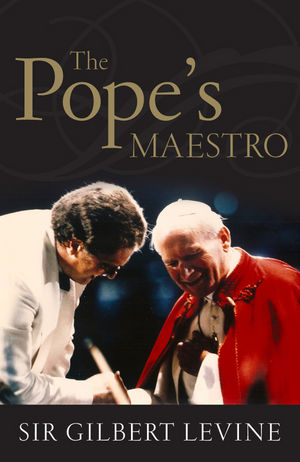The Pope's MaestroISBN: 978-0-470-49065-5
Hardcover
440 pages
October 2010, Jossey-Bass
 This title is out-of-print and not currently available for purchase from this site.
|
Connect with Wiley Publicity
The Pope’s Maestro
New Memoir Tells of Remarkable Friendship between John Paul II and American Conductor Gilbert Levine and Their Historic Concerts to Heal Relations Among Christians, Jews and Muslims
Pope John Paul II Will Be Beatified on May 1, 2011
In The Pope’s Maestro world-renowned conductor Sir Gilbert Levine tells how a nice Jewish boy from Brooklyn, who had never met a Catholic priest in his life, ended up as Maestro to one of the most beloved popes in recent history.
During his unlikely 17-year friendship with the late John Paul II, who is expected to be beatified in the near future, the two men bonded over their shared love of music and their belief in its transcendent power to heal the human spirit.
Handpicked by John Paul II, Levine worked closely with him on an initiative to use music to heal centuries-old wounds among the Abrahamic faiths. The groundbreaking concerts, broadcast internationally, used the common language of music to nurture peace and understanding among the people of the world. They included the historic Papal Concert to Commemorate the Shoah in 1994, and the 2004 Papal Concert of Reconciliation performed at the Vatican, where the Pope was flanked by the Chief Rabbi of Rome and the Imam of the Mosque of Rome.
Levine’s friendship with the pope “transformed my art and my faith in inestimable ways,” he says. “It taught me many things: the power of music and spirit to foster hope, transformation, healing and love. The mysteries of faith, not one faith but three—Judaism, Christianity, and Islam. The potential for reconciliation and redemption even in the face of the sadness and violence of both the past and the present.”
This improbable journey began in 1987 when Levine was invited by the famed Polish composer Krzysztof Penderecki to become the artistic director and conductor of the Krakow Philharmonic. For Levine, whose grandparents had emigrated from Poland, and whose mother-in-law’s entire family was killed at Auschwitz-Birkenau, near Krakow, this invitation was not one he jumped at immediately. Though it would mean living behind the Iron Curtain, he accepted, recalling what had drawn him to Krakow in the first place as a guest conductor: the music-making and his regard for the musicians.
Krakow was the archdiocese of Karol Wojtyla before he became Pope John Paul II. Summoned to the Vatican for an audience with the Pope, Levine—who had only recently met a Catholic priest for the first time—was shocked to find himself in a one-on-one conversation with John Paul that led to an invitation to conduct a Papal Concert to celebrate the tenth anniversary of the pontificate, the beginning of almost two decades of musical collaboration/peace mission.
The memoir takes on a gripping cloak-and-dagger edge as Levine describes the oppressive surveillance he endured while living in Poland, where he served with the Krakow Philharmonic until 1993. He was spied upon and trailed by the secret police, and the harassment only increased
as his relationship with the Pope grew. Apparatchiks even attempted to sabotage a concert in Paris to celebrate the Polish spirit and Solidarity, staging a bus accident that delayed the Krakow orchestra’s principal players.
“I had endured long absences from my family, lived in a country haunted by the ghosts of the Shoah and felt the repression of the Communist secret police for a reason shared by His Holiness,” Levine says. “To bring peace through music to all for whom this noble vision would resonate, to accomplish the very thing that I had so boldly told the Pope at my first audience.”
In gratitude for his service, John Paul II invested Levine as a Knight Commander of the Pontifical Equestrian Order of Saint Gregory the Great, the first pontifical knighthood awarded to an American Jew, and the first accorded to a non-ecclesiastical musician since Mozart.
Levine’s friendship with the leader of the world’s one billion Catholics deepened his own Jewish faith. During his years with the pope, Levine became more conscious of the religious nature of his Jewish heritage, and currently worships with his family at an Orthodox synagogue in Manhattan.
His relationship with the pope changed him musically as well: “My music-making now is different than it was. I listen for the stillness as well as the roar. I have learned to hear the meaning that lies cached beneath the surface of the notes. I know now that music is spirit made sound, that it has the power to make us whole. And yes, to bring us peace.”
The book includes photos of John Paul II and Sir Gilbert and the Papal concerts, plus a bonus DVD of the concert they presented in St. Mary’s Cathedral in Krakow, Poland.



